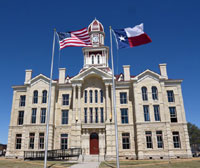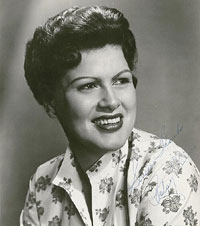1963 – American country music stars Patsy Cline, Hawkshaw Hawkins, Cowboy Copas and their pilot Randy Hughes are killed in a plane crash in Camden, Tennessee. Patsy Cline (born Virginia Patterson Hensley; September 8, 1932 – March 5, 1963) was an American singer. One of the most influential vocalists of the 20th century, she was known as one of the first country music artists to successfully cross over into pop music. Cline had several major hits during her eight-year recording career, including two number-one hits on the Billboard Hot Country and Western Sides chart. Born in Winchester, Virginia, Cline's first professional performances began in 1948 at local radio station WINC when she was 15. In the early 1950s, Cline began appearing in a local band led by performer Bill Peer. Various local appearances led to featured performances on Connie B. Gay's Town and Country television broadcasts. She signed her first recording contract with the 4 Star label in 1954, and had minor success with her earliest 4 Star singles, including "A Church, a Courtroom, Then Goodbye" (1955) and "I've Loved and Lost Again" (1956). In 1957, Cline made her first national television appearance on
Arthur Godfrey's Talent Scouts. After performing "Walkin' After Midnight," the single became her first major hit on both the country and pop charts. Cline's further singles with 4 Star Records were unsuccessful, although she continued performing and recording. In 1958, she relocated to Nashville, Tennessee, to further her career. Working with new manager Randy Hughes, Cline became a member of the Grand Ole Opry and then moved to Decca Records in 1960. Under the direction of producer Owen Bradley, her musical sound shifted, and she achieved consistent success. The 1961 single "I Fall to Pieces" became her first to top the Billboard country chart. Cline was severely injured in an automobile accident, which caused her to spend a month in the hospital. After she recovered, her next single, "Crazy," also became a major hit. During her final years, Cline had hits with "She's Got You," "When I Get Through with You," "So Wrong," and "Leavin' on Your Mind." She also toured and headlined shows with more frequency. On March 5, 1963, she was killed in the 1963 Camden PA-24 crash along with country musicians Cowboy Copas and Hawkshaw Hawkins, and manager Randy Hughes, during a flight from Kansas City, Kansas, back to Nashville. Since her death, Cline has been cited as one of the most celebrated, respected, and influential performers of the 20th century. Her music has influenced performers of various styles and genres.
























